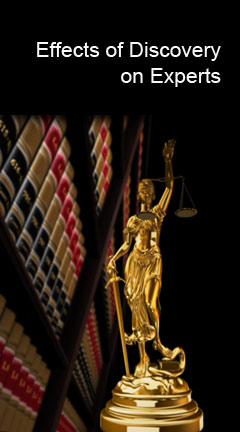Archival Notice
This is an archive page that is no longer being updated. It may contain outdated information and links may no longer function as originally intended.
Home | Glossary | Resources | Help | Course Map
Experts are affected by discovery in two distinct ways:
- The expert can be an important source of information for the state and the retaining attorney to gather data to support the case.
- The expert's lab testing, procedure, results and conclusions may be the subject of discovery by opposing counsel.
It is important to distinguish the discovery process from the expert's usual testing or technical information-gathering procedures. The expert's evidence testing is undertaken by following customary and routine lab protocols and procedures and the scientific method. The expert proceeds step-by-step, in an orderly and logical way, to obtain the test results, facts and information on which the expert will base the expert conclusion.
Discovery, on the other hand, is structured and driven by time deadlines imposed by the court or by procedural rules. Each item of discovery is undertaken in a set manner, with or without court intervention, by attorneys representing the parties in dispute. The fundamental distinction between the discovery process and the expert's inquiry is that the discovery process is ultimately subject to the court's supervision.
If the assignment is court-oriented, the expert may play an important role in pleadings and discovery preparation. He may be called on to draft technical parts of a pleading and also review discovery requests and responses for completeness and technical consistency. In some cases, the expert can help uncover a body of technical data, forms, procedures, protocol, notes or research materials.
It is often essential that the expert participates at the discovery stage to ensure that requisite technical materials are available before deposition and to assist in reducing the costs of discovery.
Additional Online Courses
- What Every First Responding Officer Should Know About DNA Evidence
- Collecting DNA Evidence at Property Crime Scenes
- DNA – A Prosecutor’s Practice Notebook
- Crime Scene and DNA Basics
- Laboratory Safety Programs
- DNA Amplification
- Population Genetics and Statistics
- Non-STR DNA Markers: SNPs, Y-STRs, LCN and mtDNA
- Firearms Examiner Training
- Forensic DNA Education for Law Enforcement Decisionmakers
- What Every Investigator and Evidence Technician Should Know About DNA Evidence
- Principles of Forensic DNA for Officers of the Court
- Law 101: Legal Guide for the Forensic Expert
- Laboratory Orientation and Testing of Body Fluids and Tissues
- DNA Extraction and Quantitation
- STR Data Analysis and Interpretation
- Communication Skills, Report Writing, and Courtroom Testimony
- Español for Law Enforcement
- Amplified DNA Product Separation for Forensic Analysts


